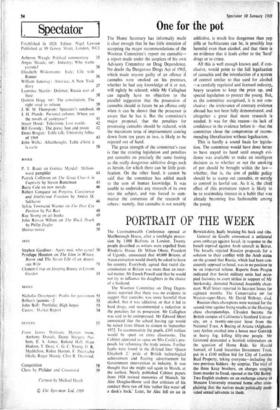One for the pot
The Home Secretary has informally made it clear enough that he has little intention of accepting the major recommendations of the Wootton Committee's report on cannabis— a report made under the auspices of his own Advisory Committee on Drug Dependence. No doubt the Dangerous Drugs Act of 1965, which made anyone guilty of an offence if cannabis . were smoked on his premises, whether he had any knowledge of it or not, will rightly be relaxed; while Mr Callaghan can equally have no objection to the parallel suggestion that the possession of cannabis should in future be an offence only when it can be shown that the possessor is aware that he has it. But the committee's major proposal, that the penalties for possessing cannabis should be reduced, with the maximum term of imprisonment coming down from ten years to two, is likely to be rejected out of hand.
The great strength of the committee's case is that the existing legislation and penalties put cannabis on precisely the same footing as the really dangerous addictive drugs such as heroin, for which there can be little justi- fication. On the other hand, it cannot be said that the committee has added much to the sum of human knowledge. It was unable to undertake any research of its own into the subject, and was forced to sum- marise the consensus of the research of others: namely, that cannabis is not notably addictive, is much less dangerous than pep pills or barbiturates can be, is possibly less harmful even than alcohol, and that there is no- evidence that it leads either to the 'hard' drugs or to crime.
All this is well enough known and, if con- clusive, would point to the full legalisation of cannabis and the introduction of a system of control similar to that used for alcohol —a carefully regulated and licensed industry, heavy taxation to keep the price up, and special legislation to protect the young. But, as the committee recognised, it is not con- clusive: the irrelevance of contrary evidence abroad has not been fully demonstrated, and altogether a great deal more research is needed. It was for this reason—its lack of confidence in the evidence before it—that the committee chose the compromise of recom- mending liberalisation without legalisation.
This is hardly a sound basis for legisla- tion_ The committee would have done better to have stayed its hand until enough evi- dence was available to make an intelligent decision as to whether or not the smoking of pot should be brought within the law— whether, that is, the aim of public policy should be to stamp out cannabis, or merely to control its lawful use. As it is, the chief effect of this premature report is likely to be to restimulate interest in a habit that was already becoming less fashionable among the young.


































 Previous page
Previous page